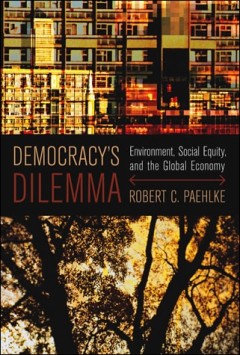Filter by

Paths to a green world :the political economy of the global environment
This comprehensive and accessible text fills the need for a political economy view of global environmental politics, focusing on the ways key economic processes affect environmental outcomes. It examines the main actors and forces shaping global environmental management, particularly in the developing world. Moving beyond the usual academic emphasis on international agreements and institutions,…
- Edition
- -
- ISBN/ISSN
- 9780262270403
- Collation
- 1 online resource (xxi, 327 pages) :illustrations
- Series Title
- -
- Call Number
- -

Indra's net and the Midas touch :living sustainably in a connected world
An exploration of the impact of unintended consequences in an interdependent world and of the opportunities for creativity and community.OCLC-licensed vendor bibliographic record.
- Edition
- -
- ISBN/ISSN
- 9780262298858
- Collation
- 1 online resource (ix, 330 pages) :illustrations
- Series Title
- -
- Call Number
- -

The Decline of the Welfare State: Demography and Globalization
An analysis of the welfare state from a political economy perspective that examines the effects of aging populations, migration, and globalization on industrialized economies.In The Decline of the Welfare State, Assaf Razin and Efraim Sadka use a political economy framework to analyze the effects of aging populations, migration, and globalization on the deteriorating system of financing welfare…
- Edition
- -
- ISBN/ISSN
- 9780262282147
- Collation
- 1 online resource (viii, 133 pages) :illustrations.
- Series Title
- -
- Call Number
- -

Democracy's dilemma: environment, social equity, and the global economy
A call for a balancing of economic, environmental, and social concerns in the age of global economic integration.The realities of global economic integration are far more complex than many of its supporters or detractors acknowledge. One consequence of simplistic thinking about globalization, claims Robert Paehlke, is that we tend to focus on economic prosperity to the neglect of such other imp…
- Edition
- -
- ISBN/ISSN
- 9780262281164
- Collation
- 1 online resource (ix, 306 pages)
- Series Title
- -
- Call Number
- -

Illicit Trade and the Global Economy
Economists explore the relationship between expanding international trade and the parallel growth in illicit trade, including illegal drugs, smuggling, and organized crime.OCLC-licensed vendor bibliographic record.
- Edition
- -
- ISBN/ISSN
- 0262298686
- Collation
- 1 online resource (x, 266 pages) :illustrations.
- Series Title
- -
- Call Number
- -

Environmental Inequalities Beyond Borders: Local Perspectives on Global Injus…
Case studies demonstrate the spatial disconnect between global consumption and production and its effects on local environmental quality and human rights.OCLC-licensed vendor bibliographic record.
- Edition
- -
- ISBN/ISSN
- 9780262295680
- Collation
- 1 online resource (vi, 303 pages) :illustrations, map.
- Series Title
- -
- Call Number
- -

Israel and the world economy :the power of globalization
This book provides rigorous analysis of some of the major episodes during Israel's economic transition and spells out, empirically, how globalization played a crucial role in advancing Israel's economic progress. Economists and policy makers can gain insights as to how a globalized economy can take advantage of international trade, labor mobility, its international financial links, while at the…
- Edition
- -
- ISBN/ISSN
- 9780262344234
- Collation
- 1 online resource
- Series Title
- -
- Call Number
- -

Academic star wars :excellence initiatives in global perspective
"This book collects case studies on academic excellence initiatives in nine countries, and provide an analysis of how these initiatives shape higher education within national and international systems. This book updates and expands Altbach & Salmi's 2011 work on AEIs and the political economy of higher education"--OCLC-licensed vendor bibliographic record.
- Edition
- -
- ISBN/ISSN
- 9780262376693
- Collation
- 1 online resource
- Series Title
- -
- Call Number
- -

The unequal effects of globalization
"A look at the effects of globalization on within-country inequality and implications of policies to address this"--OCLC-licensed vendor bibliographic record.
- Edition
- -
- ISBN/ISSN
- 9780262375566
- Collation
- 1 online resource.
- Series Title
- -
- Call Number
- -

Parenting on earth :a philosopher's guide to doing right by your kids-and eve…
"We raise our children in a fragile world. Climate change, pandemics, superbugs resistant to antibiotics. Extreme inequality, endemic poverty, institutionalized racism and sexism. What does it mean to be a "good parent" in the face of all this? This book is one woman's quest for an answer, as a philosopher and as a mother"--OCLC-licensed vendor bibliographic record.
- Edition
- -
- ISBN/ISSN
- 9780262372817
- Collation
- 1 online resource
- Series Title
- -
- Call Number
- -
 Computer Science, Information & General Works
Computer Science, Information & General Works  Philosophy & Psychology
Philosophy & Psychology  Religion
Religion  Social Sciences
Social Sciences  Language
Language  Pure Science
Pure Science  Applied Sciences
Applied Sciences  Art & Recreation
Art & Recreation  Literature
Literature  History & Geography
History & Geography